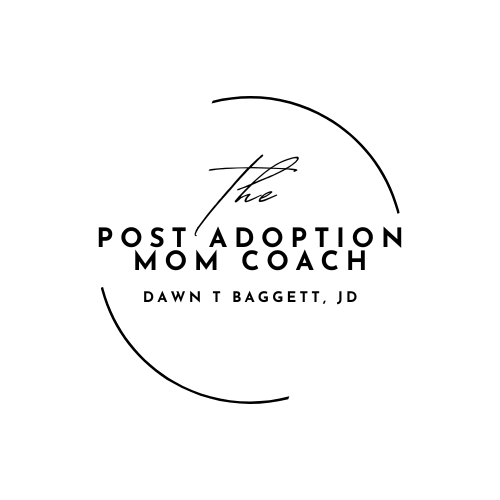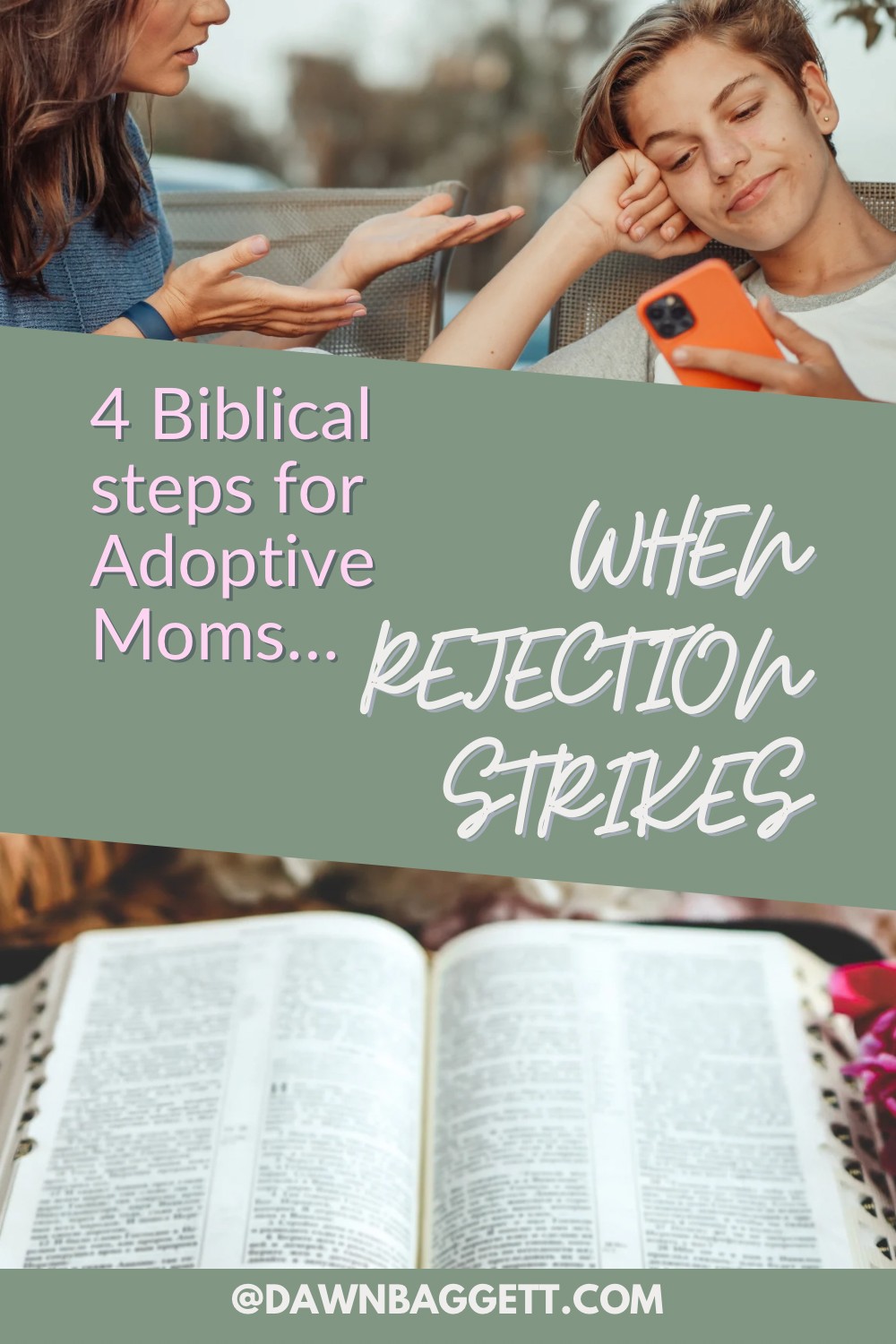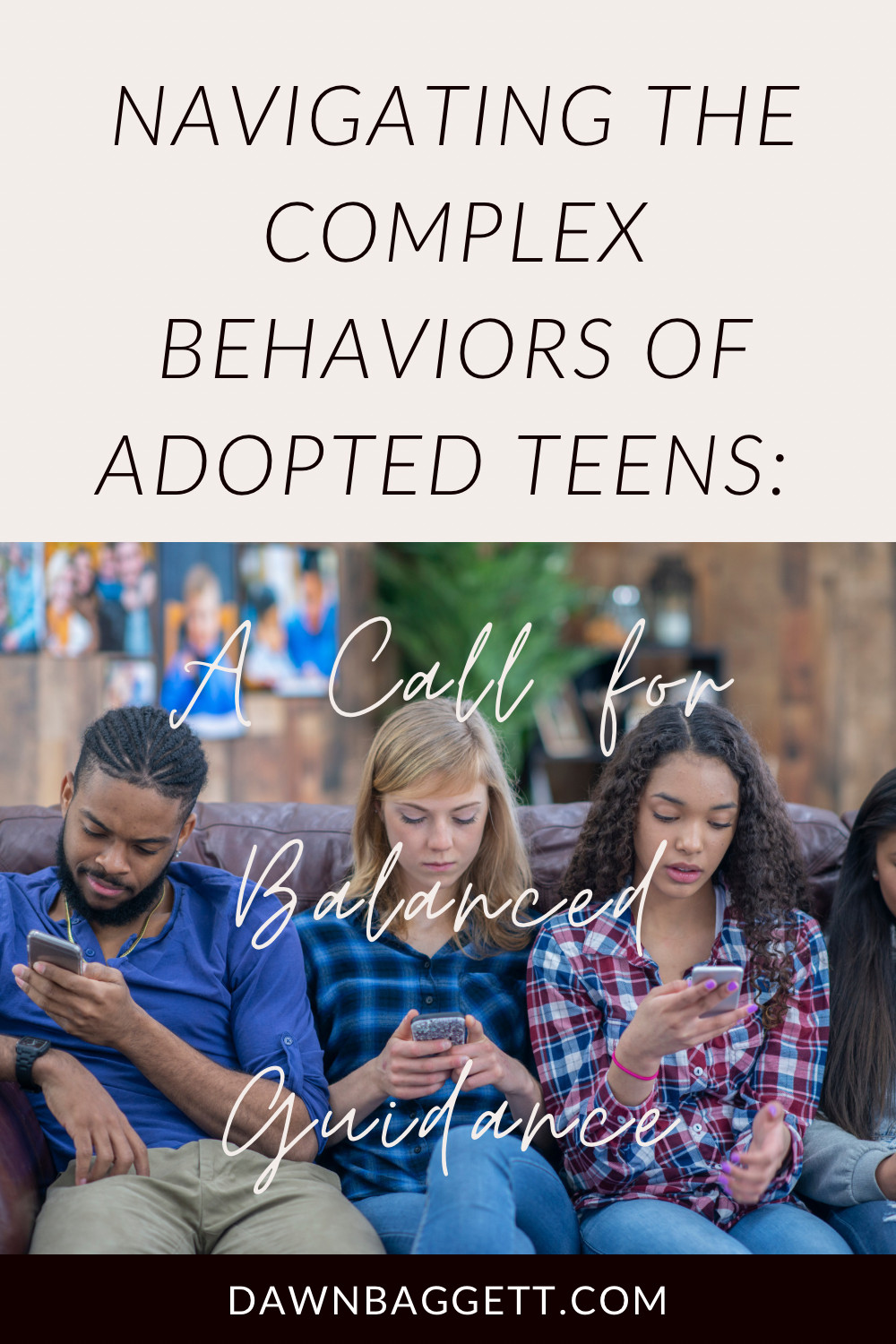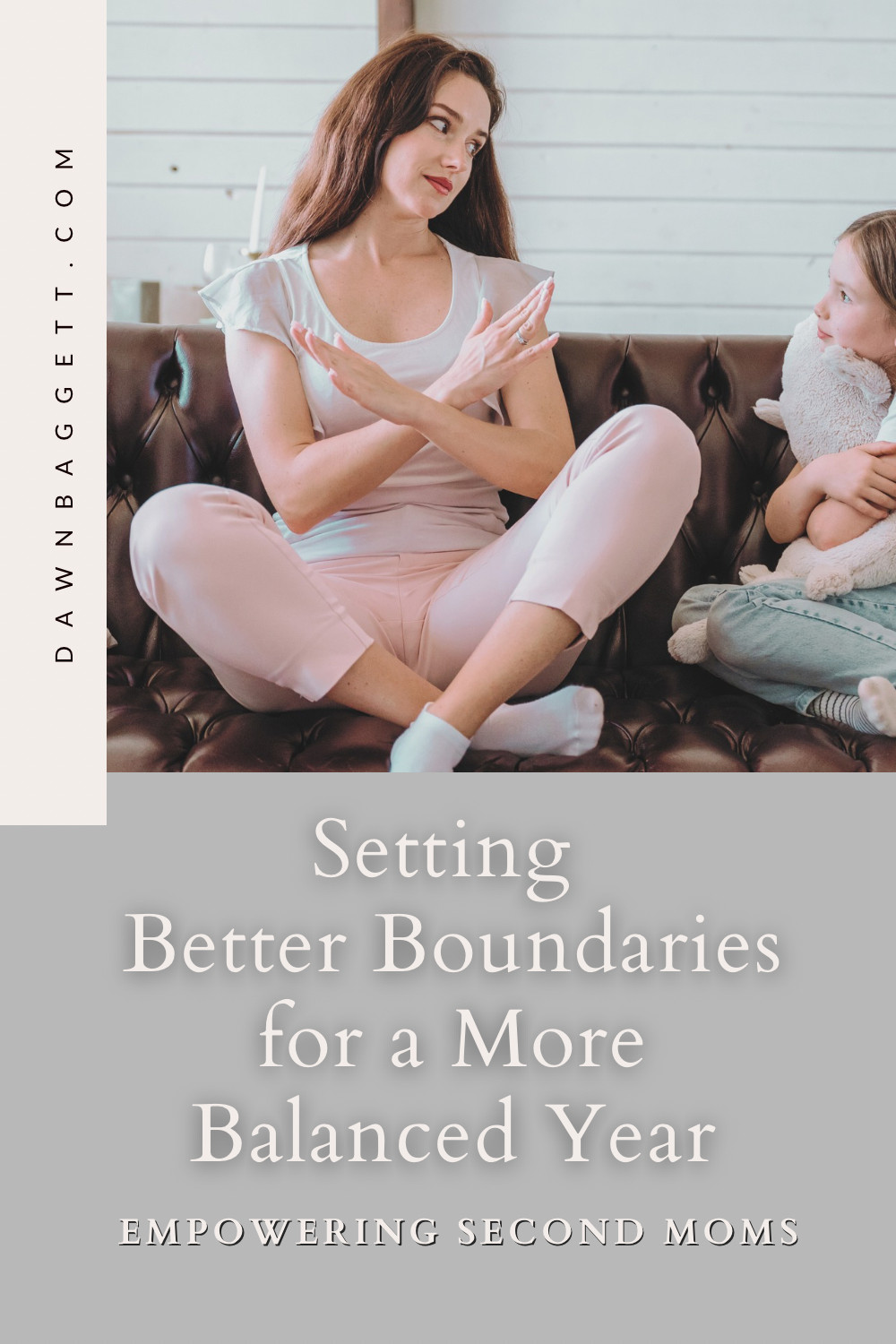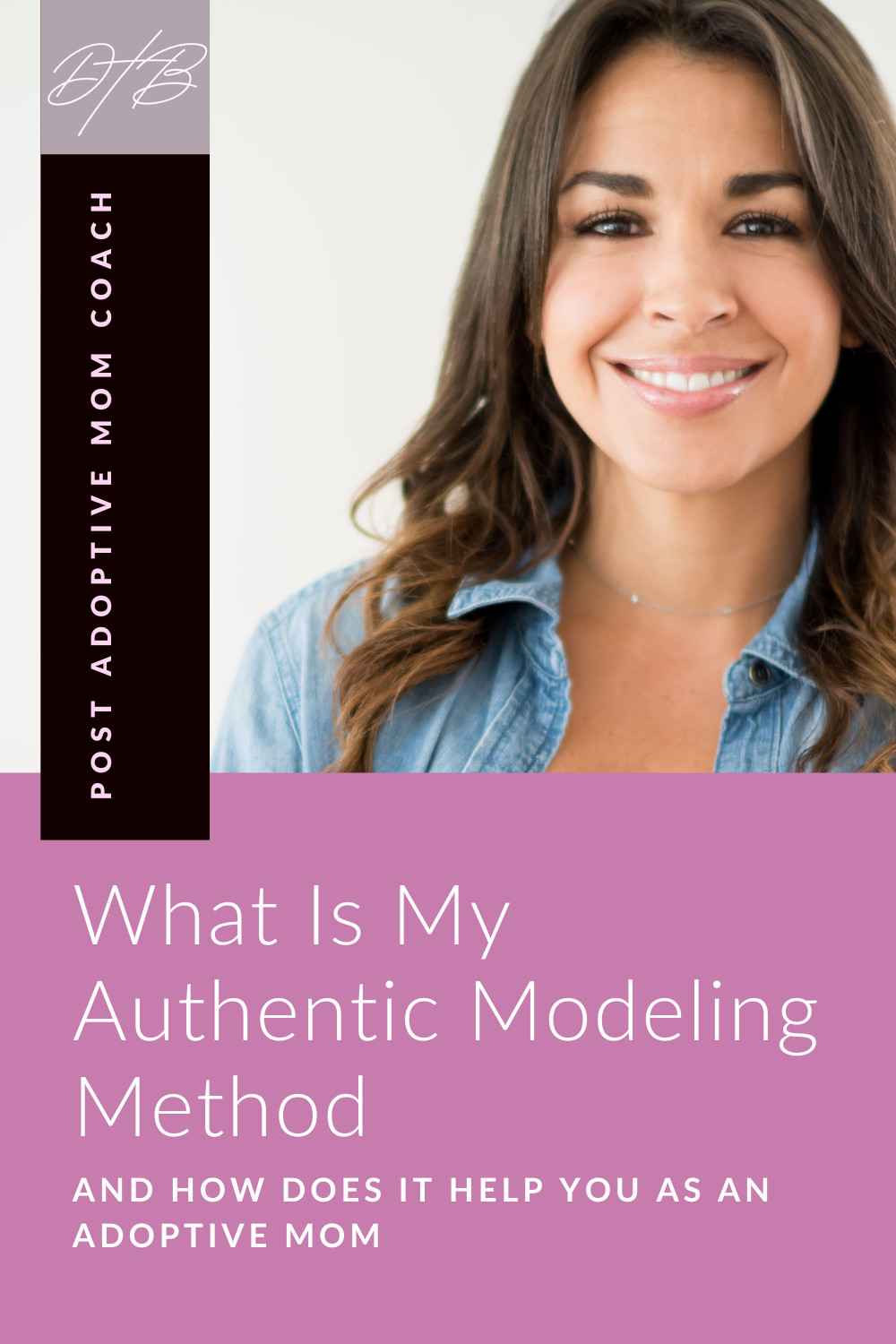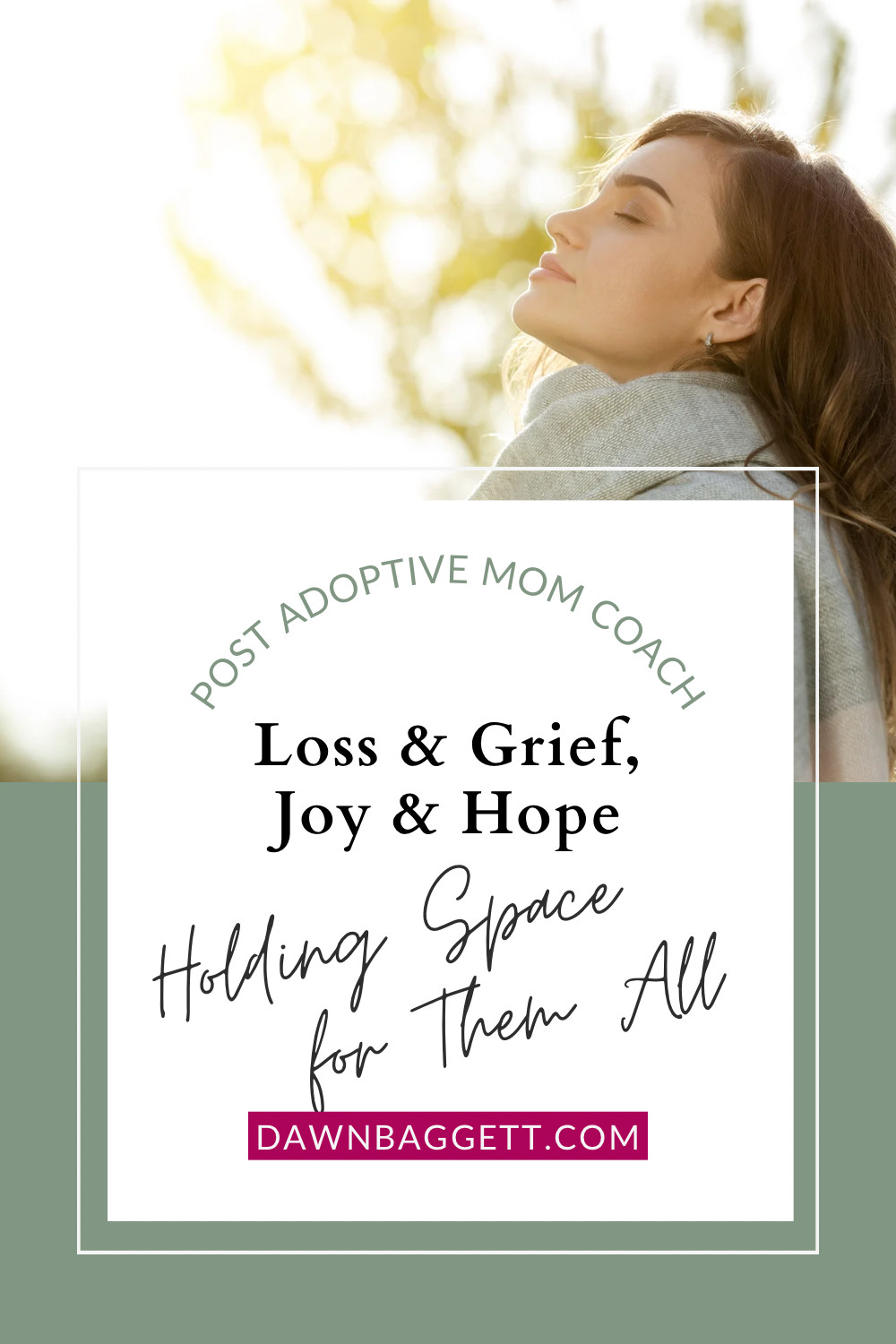
As Christians we don’t simply want behaviors to be managed, we want hearts to be transformed and lives to be transformed.
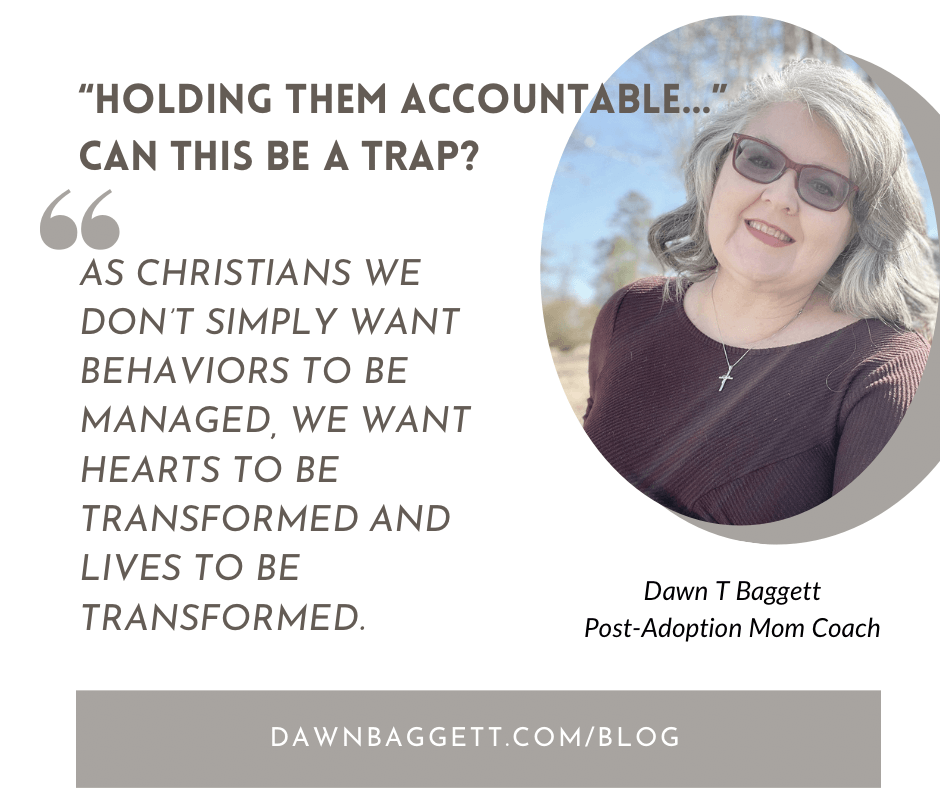
We can’t do that on our own because we aren’t God, but we can be tools that God uses in the lives of our children… when we don’t overstep our bounds.
And the accountability traps that I see adoptive moms falling into (and fall into myself) can hinder rather than help our children in the transformation of becoming self-accountable.
CAN ADOPTIVE MOMS AVOID THE ACCOUNTABILITY TRAP & WHAT IS IT ANYWAY?
The idea of “accountability” gets thrown around a lot. We could use some clarification around what accountability is and how best to think about accountability within our adoptive or blended families.
Accountability and responsibility are related words. You might say we’re responsible for certain actions and we may be accountable to a certain someone regarding those actions.
Second moms, especially in our adoptive/blended households where there’s ongoing triangulation happening – a whole topic itself – I frequently witness these moms lamenting that they are the only person attempting to hold their challenging child (teenager in most cases) accountable. So much so that the “holding them accountable” gets the focus and becomes a bigger issue than the original issue itself at times.
I want to warn you.
This is a trap.
This is what I call an accountability trap.
One I’ve fallen into myself.
We’re not God, we're merely parents. And it’s important to have a clear distinction as to where our parent role really ends. The following verses can help us to do that.
“Do not say, “I’ll pay you back for this wrong!” Wait for the Lord, and he will avenge you.”Proverbs 20:22 NIV

“Do to others as you would have them do to you.” Luke 6:31 NIV
“Do not pay attention to every word people say, or you may hear your servant cursing you— for you know in your heart that many times you yourself have cursed others.” Ecclesiastes 7:21-22 NIV
“Above all, love each other deeply, because love covers over a multitude of sins.”
“Love is patient, love is kind. It does not envy, it does not boast, it is not proud. It does not dishonor others, it is not self-seeking, it is not easily angered, it keeps no record of wrongs. Love does not delight in evil but rejoices with the truth. It always protects, always trusts, always hopes, always perseveres.” 1 Corinthians 13:4-7 NIV
“When I was a child, I talked like a child, I thought like a child, I reasoned like a child. When I became a man, I put the ways of childhood behind me.” 1 Corinthians 13:11 NIV
“There is no fear in love. But perfect love drives out fear, because fear has to do with punishment. The one who fears is not made perfect in love.” 1 John 4:18 NIV
“For the Spirit God gave us does not make us timid, but gives us power, love and self-discipline.” 2 Timothy 1:7 NIV
Self-Accountability — An Inside Job
In general, accountability for us as adults is an inside job. We get to choose who we’re going to hold ourselves accountable to. We choose our spouse, our job, our church, our friends. As our kids get older, it falls to them to internalize accountability as well. To hold themselves accountable…and choose wisely whomever and to what extent they put themselves accountable to.
And we can help them!
How?
Four Shifts Second Moms Can Make Starting Today!
I want to share some shifts that if you haven’t already made, you can start making today in the way that you think about accountability with your children, especially those ages 12 and over.
- Shift #1 is that Accountability starts with you. Model taking ownership of your responsibilities and commitments and be consistent. My incorporates this shift. The basic premise being that instead of a more direct approach we’ll use the indirect approach of modeling to influence our high conflict kids. We also want to incorporate personal boundaries as part of this approach. I can get deeper and more detailed with my private coaching clients. But the initial shift in thinking is that you are holding yourself (whom you have much greater control of) accountable rather than your child/teen.
- Shift # 2 is to Be fair. This is easier said than done, especially in the eyes of our kids. Some children will cooperate and comply easier than others. Some will do so pleasantly and some with an unpleasant attitude. ALL will be impacted negatively whenever you show favoritism one way or the other (even when you have a good reason!!) So we must be sensitive to the perceptions of unfairness, even when it’s unavoidable such as one child needing a great deal of care, financial help, or specialized accommodations.
- Shift #3 is to Set them up for success so that accepting accountability feels empowering to them, not a set up in which they’re destined to fail. This shift gives them a choice and helps satisfy the natural drive for autonomy.
- Shift #4 is to Set expectations that presume not only their success, but also some level of accountability.
Accountability vs Responsibility
One definition of accountability from the field of accounting says, “Accountability is the acceptance of responsibility for one’s own actions, and implies a willingness to be transparent“ – (link to article)
According to Britannica, the term, accountable originates from the Latin word meaning “to count“. To be accountable required a person to produce “a count” of either properties or money that had been left in his care. Later the word accountability expanded into other areas – politics and administration, law and institutional settings.
“In his care” sounds like some one or some thing this person has been given responsibility for. In parenting we’ve been given responsibility for the wellbeing of our children and guiding them to adulthood.
In fact, I learned that it’s a rather recent word found in English dictionaries only since the 1980s. Currently it’s use has exploded into other areas of life into a “culture of accountability”. Sometimes used interchangeably with the word responsibility, the distinction is often unclear and the meaning of both words muddied.
As I looked into accountability in regards to parenting our children in the Bible, I made a list regarding the responsibilities & the accountability associated with being a parent. Primarily…
- We are to be accountable TO or before God. Matthew 1236, Romans 14:12, II Corinthians 5:10.
- We’re to be accountable TO each other as Christians.
- We’re to be accountable FOR those under our care. Hebrews 13:17
One of the responsibilities we have to our children is to “restore them gently“– Galatians 6:1.
An article from Cornerstone for Parents provided some insight on how to restore gently.
{I couldn’t find the exact article but for more see cornerstoneforparents.com}
– Seek them out and don’t let them wallow in their mess ups.
– Ask good questions, not questions that encourage or tempt them to lie.
– Calmly state the consequence.
– Discipline with compassion.
As parents we are to do a number of things according to a variety of Bible verses, I won’t list all the verses here, but here are several things I found that as parents we are to do and not do regarding our children. In no particular order…
We are to:
– have compassion toward our children.
– Tell about God‘s faithfulness, praises, strength & works.
– Love them
– train them.
– teach and instruct them of the Lord.
– provide Discipline
– Proverbs 22:15 and 13:24 speak of the “Rod of discipline“ which I have come to believe is a comparison not a definition.
Further, We are not to:
– provoke
We’re also not to exasperate them. The verse, Colossians 3:21 that says not to provoke in one version is translated to not exasperate in another.
– not to despise our children
– not cause them to sin
– not hinder them from coming to Jesus
– not hold back discipline,
This particular verse stated that if you“strike him with the rod he will not die“ in speaking about discipline.
Folks differ on the meaning of this phrase; I have gone back-and-forth with it myself. At this point I believe that like “rod of discipline” in the above verses, it’s a comparison, like a metaphor.
For example, a targeted blow to stop the sheep from going off a cliff to its death would save its life! So this is like a metaphor when it speaks of the Rod, as a shepherd would use with his sheep to save its life; a view of how disciplining our child could actually save the child’s life even though the child may be very intently complaining about whatever the discipline is.
I think this is encouraging to parents to let our child feel the weight of the discipline. It uses exaggeration to make a point. And that child might be complaining to the point that oh my goodness you think they were dying and they’re really not and so I think this verse has been taken out of context over the years and really done damage. Rather it’s encouraging us to discipline in the way that would be effective and not back down from that just because our child is complaining and acting like they’re gonna die or something. (…Eye Roll…)
- We are to provide for our children; and I Timothy also says in chapter 3, verse four, we’re to “keep them under control with all dignity”. This is another verse that may tend to be misinterpreted, and I’m leaning toward, “with all dignity” meaning that we don’t punish or discipline them in such a way that it would strip them of their dignity.
Discipline > Punishment
Discipline is a word that is often equated with punishment; but it doesn’t always have to be punishment. The meaning of the word discipline is greater than mere punishment.
You decide - are you going to use punishment as a small part of your discipline or is it just all one & the same to you? Or do you prefer to avoid punishment in your discipline methods altogether?
First, decide your goal and ask yourself, is it discipline or is it punishment?
So when we’re thinking about accountability in our homes and our families with our most challenging children and all of our children, we want to first think about what our goal is with holding our child, older child or teen accountable.
Next consider your options and expected results.
And I’m saying those two as separate things even though I know one of the definitions above for discipline is punishment. I want us to think of them in two different buckets. Will the action you’re considering work well to meet your goal or goals? Will it undermine other competing or more important goals or long-term goals?
Third is determine my actions.
Number one is your goals. Number two is your options and expected results and number three is your actions. When our actions are reactive we are more vulnerable to falling into an accountability trap.
I hope that you can also begin implement what will help you to be calm and responsive versus reactive so that even when you really feel reactive you’ll be able to pull back and get your own self settled so that you can approach it in a more responsive way that doesn’t prompt them to counter-react to your reaction and cause things to go off the rails.
That’s all I have for you today. I hope it’s given you something to consider.
As a post adoption coach, it’s my goal to stand in the gap for second moms, particularly Christian women who are moms in nontraditional adoptive mom roles in challenging, complex families. If this is you, be sure to join the free Facebook Group for second moms HERE.
______________________________________________________

Post Adoption (Mom) Coach
“STANDING IN THE GAP FOR SECOND MOMS in Adoptive & Blended Families
As a Certified LifeMapping(R) Coach, Dawn helps Christian adoptive moms navigate the challenges of their non-traditional families with their own brand of (faith fueled) success!
DISCLAIMER: I’m a coach, not a doctor nor a therapist. As a coach I do not offer mental or medical health diagnosis, treatment or cures. Furthermore, I am no longer a practicing attorney and do not offer individual legal advice. For individual advice related to your own personal situation I recommend you seek out an appropriate professional. Coaching may fill a spot in your overall support network.
—
Copyright © 2025 Dawn T. Baggett, JD - All rights reserved
—
